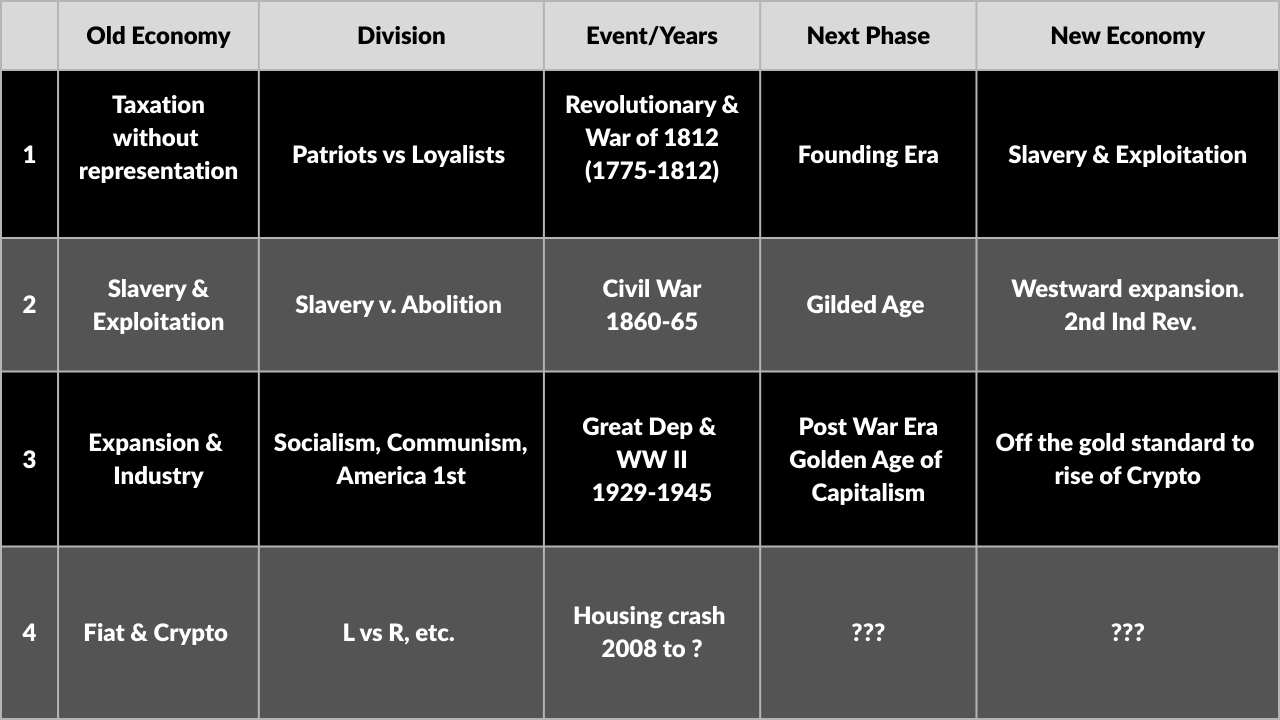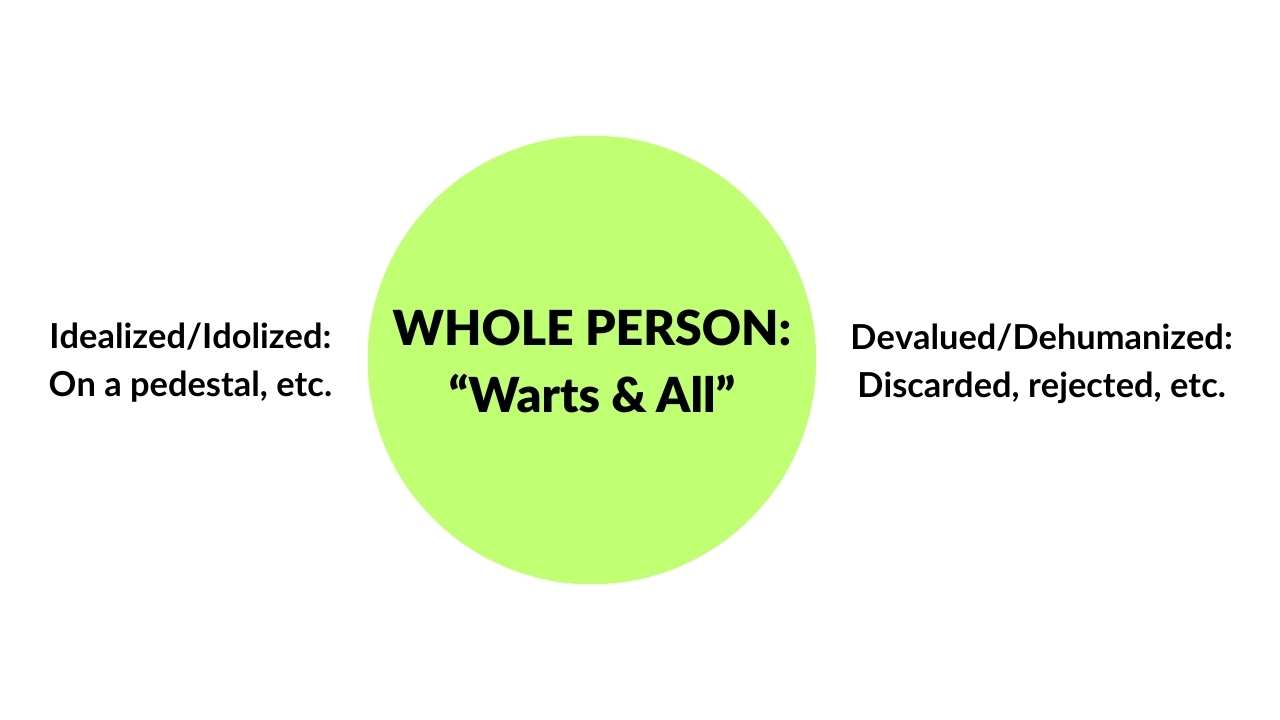I. Intro.
A. Discerning the times.
1. Matt 16:3 Jesus told us to discern the signs of the times.
“Hypocrites! You know how to discern the face of the sky, but you cannot discern the signs of the times.”
2. Matthew 24:9-14
9 “Then they will deliver you up to tribulation and kill you, and you will be hated by all nations for My name’s sake. 10 And then many will be offended, will betray one another, and will hate one another. 11 Then many false prophets will rise up and deceive many. 12 And because lawlessness will abound, the love of many will grow cold. 13 But he who endures to the end shall be saved. 14 And this gospel of the kingdom will be preached in all the world as a witness to all the nations, and then the end will come.
B. This point in history.
1. We are living in the end of a transitional period between ages called a ‘turning’. Happens every 80 years or so, the transition lasts about 25-30 years.

a. The last turning and transitional period was The Great Depression & WWII.
b. The old system stopped working for the majority, rise of socialism, etc.
c. There was an America First & an Anti Fascist movement in the 30’s.
2. The last turning led to WWII. The situation that we are in today as Christians is similar to the situation the German church found themselves in during Hitler’s rise to power.
a. Similar. I am in no way suggesting that anyone today is a Nazi or Hitler.
b. We should not be making that comparison anymore. (Fetterman)
c. Similar in the sense that our nation is undergoing great upheaval and turmoil leading to polarization and civil unrest.
3. We should learn from what they went through that we must speak the truth in love.
a. Most of the German church did not actively speak up against the atrocities
b. Only a minority (like Bonhoeffer and the Confessing Church) truly opposed him.
c. Silence and compromise were far more common than outspoken resistance.
d. Bonhoeffer: “Silence in the face of evil is not neutrality, it’s complicity.”
4. After the war, much of the church regretted not having taken a stronger stand against the Nazis’ crimes. The Stuttgart Declaration of Guilt, October 19th, 1945 issued by the Council of the Evangelical Church in Germany.
a. “We accuse ourselves for not standing to our beliefs more courageously, for not praying more faithfully, for not believing more joyously, and for not loving more ardently.”
5. The church has been given the truth of God’s Word, truth is found no where else on earth.
a. 1 Tim 3:15 “…the church of the living God, the pillar and ground of the truth.”
b. If we don’t speak up, truth will not come from anywhere else.
6. Let’s not wait until after the storm to regret our silence. Let’s speak up now.
C. Charlie Kirk assassination and the fallout.
1. Charlie Kirk’s assassination is also sign of the times.
2. Charlie was our brother in Christ. He spoke boldly about his faith and about the many of the deceptions that are that hold so many in this nation in bondage.
a. I do think that he said some things that were not Christlike.
b. I know much of what he said has been taken out of context, but I checked some things out for myself and heard him in his own words.
c. But he said nothing that was deserving of death.
d. And it’s not fair that he will never get the chance to grow in sanctification and maturity in Christ.
3. I believe that he was martyred. A martyr is anyone who is killed for their beliefs, religious or otherwise, and he was murdered for what he believed.
4. To me, his death really brings home the words of Jesus in Acts 1:8 “…you shall be witnesses to Me in Jerusalem, and in all Judea and Samaria, and to the end of the earth.”
a. witnesses: martyr, it means ‘a witness’
b. “…those who after his example have proved the strength and genuineness of their faith in Christ by undergoing a violent death.”
D. God has chosen us to be alive in this time to carry the gospel to the nations.
1. Acts 17:26
2. John 15:16
“You did not choose Me, but I chose you and appointed you that you should go and bear fruit, and that your fruit should remain, that whatever you ask the Father in My name He may give you.”
II. The Ministry of Reconciliation.
A. 2 Corinthians 5:18-21
18 Now all things are of God, who has reconciled us to Himself through Jesus Christ, and has given us the ministry of reconciliation, 19 that is, that God was in Christ reconciling the world to Himself, not imputing their trespasses to them, and has committed to us the word of reconciliation. 20 Now then, we are ambassadors for Christ, as though God were pleading through us: we implore you on Christ’s behalf, be reconciled to God. 21 For He made Him who knew no sin to be sin for us, that we might become the righteousness of God in Him.
1. Reconcile: to be restored to favor, to be made one, to bring together those who are at odds
a. Also: an accounting, to reconcile a checkbook, reconcile accounts
b. Reconciling can involve giving an explanation of the charges
c. Reconciliation is not forgiveness, it only takes one to forgive, at least 2 to recon.
2. Ministry of Reconciliation: the work of restoring people to favor worth God.
a. God is already the willing party, waiting in the conference room.
b. Our job is to convince the lost to come to the table and Abe reconciled to Him.
c. Word of reconciliation: Logos, the doctrine, the teaching AND how it is said.
3. Ambassador:
a. to act as a representative
b. represent their home country while they live and work in a foreign country.
c. have to remain neutral to work with all sides of the foreign country.
d. represent the values, culture and interests of the home culture.
B. Reframing evangelism as reconciliation.
1. Often we think of evangelism and we become intimated and overwhelmed. We think of apologetics and debates. We think that we have to be super knowledgeable about theology before we can even begin to evangelize.
2. But when we think of reconciling, it changes that. Instead of debating with the lost, we are inviting them to sit down at the table of communion with God.
3. We are not responsible to convince them to think like us… instead we are trying to restore them to fellowship with God.
4. Imagine that Father God was sitting at a table that He prepared to dine with us, but we were far from Him because of our sin.
a. So Father, Son and Holy Spirit decided that Jesus would come search for us until
He found us.
b. Then He would die on our behalf so that we could be brought to the table and be
restored to fellowship with God.
5. Jesus didn’t debate us into the kingdom. Instead, He showed us the way to the Father, He taught us the truth of God’s Word and He gave us His abundant life.
6. And now that we have been reconciled to God, He has given us the same mission, to reconcile those who are far from God and bring them into fellowship with Him again.
7. Jesus didn’t call us to win arguments, He called us to win people.
III. Whole Object Relations: the essential skill of reconcilers.
A. Whole Object Relations.
1. Whole Object Relations is the ability to see another person as a complete, realistic whole — recognizing that they have both good and bad qualities at the same time.
2. Instead of viewing people as all good (idealizing) or all bad (devaluing), whole object relations means you can hold both sides together and relate to them in a balanced way.

3. Think of the saying “Warts and all.” Attributed to Oliver Cromwell (circa 1654).

Lely, Peter; Oliver Cromwell (1599-1658); Birmingham Museums Trust; http://www.artuk.org/artworks/oliver-cromwell-15991658-33233
a. Cromwell instructed his portrait artist, Sir Peter Lely, not to flatter him.
“I desire you would use all your skill to paint your picture truly like me… but remark all these roughness, pimples, warts and everything as you see me. Otherwise, I will never pay a farthing for it.”
b. “Warts and all” is a perfect summation of Whole Object Relations because it forces us to acknowledge the beautiful and the broken that exits in us simultaneously.
4. The extremes of WOR are idealizing (or idolizing) on one side and devaluing (or dehumanizing) on the other.
a. Idealizing: they can do no wrong, I agree with everything they say.
b. Devaluing: they are the worst kind of human and I can’t even talk to them.
5. If we can’t accept people wards and all, then we are trying to love an imaginary version of them, a version of them after we have fixed them, changed them, etc. Instead we have to accept them as they are and allow God to sanctify them.
B. Two types of people who struggle to develop WOR and one type that is good at it.
1. Two types who struggle:
a. Narcissists: black and white, must love them or hate them, have to agree or else
b. People with cPTSD from an abusive and traumatic childhood. (When someone is nice to them they feel overly safe, when the person is not nice they feel overly threatened, etc.)
2. Type of people who are naturally the best at this: children.
3. Developing WOR will also help with…
a. Your marriage (WOR is why your spouse can stay married to you.)
b. Your family, stop trying to change behaviors and accept them as they are, acceptance leads to trust, trust leads openness where you can begin to share the truth.
c. The church, as we accept one another and be reconciled to one another.
d. Help you move past perfectionism, if you can accept that there are strengths and weaknesses in you at the same time.
e. Help us move past legalism because when we can accept that we are a mixed bag and that God is working in us to sanctify us, we stop working so hard to prove that we are all good, or more good than bad, etc.
C. Why this matters.
1. Because the vast majority of people in our nation cannot do this, especially when it comes to politics and social issues.
a. The vast majority of people either idolize or dehumanize
2. If we are not careful, we will follow the heard and go along with this and it will make forgiveness, reconciliation and speaking the truth in love impossible.
3. We have to develop the ability to see people as they are, trapped in bondage, deceived by the god of this world, etc. and yet also see their potential in Christ. Not just see them as they are now but see what God has called them to.
4. We get hung up on dysfunction and want to fix them. This leads to arguing, debating, etc. and the result is a stalemate. We have to first reconcile them to God AS THEY ARE… and trust that God will sanctify them once they are His.
5. We have to stop focusing on changing their behavior and making sure they think like we do and instead focus on the reconciliation of their soul to God.
D. Jesus gives an example of this.
1. Luke 22:31-34
31 And the Lord said, “Simon, Simon! Indeed, Satan has asked for you, that he may sift you as wheat. 32 But I have prayed for you, that your faith should not fail; and when you have returned to Me, strengthen your brethren.” 33 But he said to Him, “Lord, I am ready to go with You, both to prison and to death.” 34 Then He said, “I tell you, Peter, the rooster shall not crow this day before you will deny three times that you know Me.”
2. Jesus saw that Peter loved Him, would deny and betray Him and eventually would repent and come back around to following Him.
3. Jesus saw the good, the bad and the potential, the future relationship with Peter after Peter repented and was restored.
4. AND Jesus chose not to be offended but instead to operate from the future after Peter would be reconciled to Him.
IV. Four essential steps to develop the ministry of reconciliation.
A. Meditate on your own reconciliation to God.
1. Colossians 1:19-22
19 For it pleased the Father that in Him all the fullness should dwell, 20 and by Him to reconcile all things to Himself, by Him, whether things on earth or things in heaven, having made peace through the blood of His cross. 21 And you, who once were alienated and enemies in your mind by wicked works, yet now He has reconciled 22 in the body of His flesh through death, to present you holy, and blameless, and above reproach in His sight—
2. This will keep our own salvation fresh and give us compassion for the lost.
3. To develop WOR, allow the Lord to heal your past wounds and trauma.
B. Practice on the people in your life.
1. Rom 15:7 “Therefore receive one another, just as Christ also received us, to the glory of God.”
a. Jesus didn’t idealize nor condemn us, He simply received us as we are.
b. I’m not saying we need to accept sin, but we accept the person.
2. 1 Peter 4:8&9
8 And above all things have fervent love for one another, for “love will cover a multitude of sins.” 9 Be hospitable to one another without grumbling.
C. Stay on Mission.
1. Romans 10:13-15
13 For “whoever calls on the name of the Lord shall be saved.”14 How then shall they call on Him in whom they have not believed? And how shall they believe in Him of whom they have not heard? And how shall they hear without a preacher? 15 And how shall they preach unless they are sent? As it is written: “How beautiful are the feet of those who preach the gospel of peace, who bring glad tidings of good things!”
2. Don’t let fear shut you down.
3. John 15:18-20
18 “If the world hates you, you know that it hated Me before it hated you. 19 If you were of the world, the world would love its own. Yet because you are not of the world, but I chose you out of the world, therefore the world hates you. 20 Remember the word that I said to you, ‘A servant is not greater than his master.’ If they persecuted Me, they will also persecute you. If they kept My word, they will keep yours also.
D. Speak the truth in Love.
1. Proverbs 3:3&4
3 Let not mercy and truth forsake you; bind them around your neck, write them on the tablet of your heart, 4 and so find favor and high esteem in the sight of God and man.
2. Ephesians 4:15
15 but, speaking the truth in love, may grow up in all things into Him who is the head—Christ—
3. Know the difference between content and packaging.
V. Closing.
A. Closing summary.
Every person you meet is a mix of beautiful and broken. Every person you meet has both scars and potential. And every person you meet is someone Christ died to reconcile.
The same blood of Jesus that reconciled you is strong enough to reconcile our worst enemy.
Our calling is not to fix them, not to debate them, not to idolize or dehumanize them—but to reconcile them to God. As Christ has received us, so let us receive them. And in doing so, we will be the ambassadors He called us to be—truth tellers, peacemakers, reconcilers in a world that desperately needs it.

